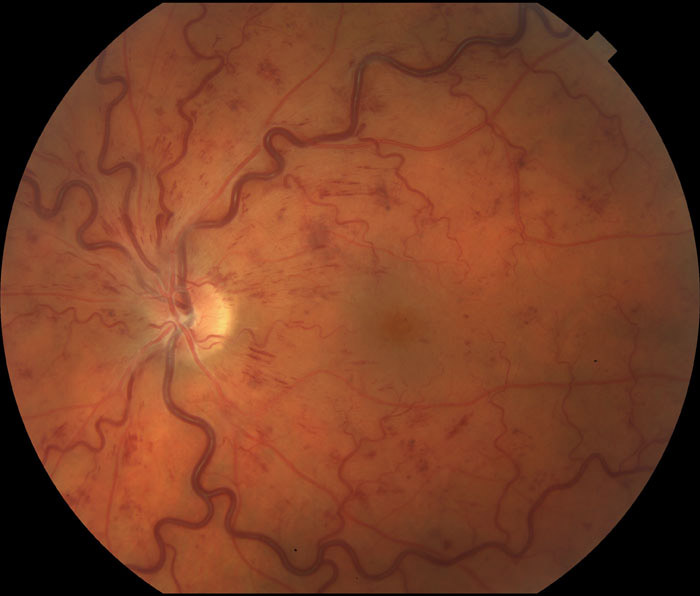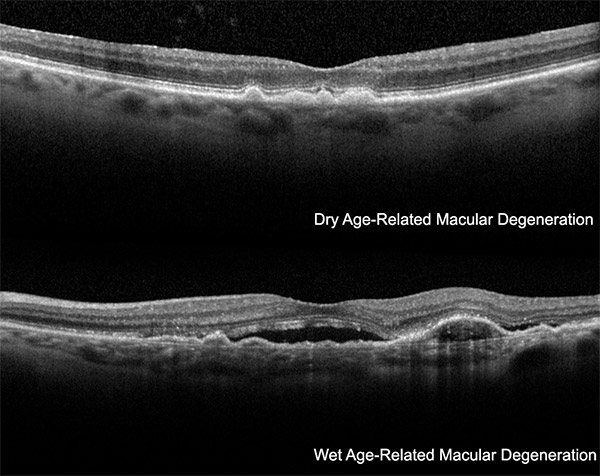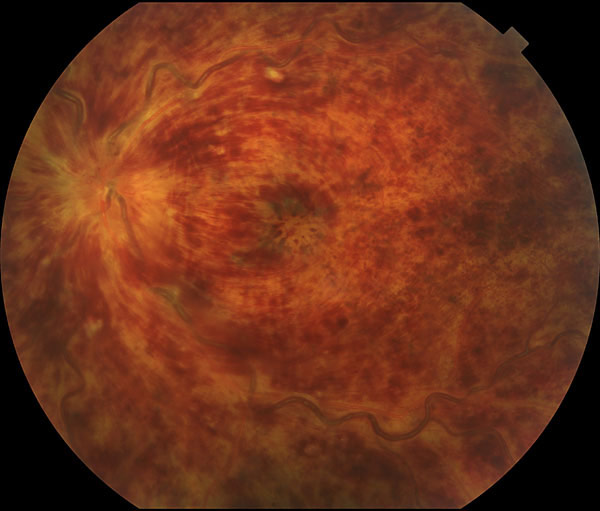 (212) 861-9797
(212) 861-9797
 (212) 861-9797
(212) 861-9797
Retinal vein occlusion is second only to diabetic retinopathy as a cause of vision loss due to disease affecting the blood circulation of the retina. There are two types: branch retinal vein occlusion (BRVO) and central retinal vein occlusion (CRVO).

 A BRVO is essentially a blockage of one of the small blood vessels that drains blood from the retina. Arteries carry blood to the retina. Red blood cells and plasma fluid then travel through ever smaller blood vessels called capillaries and ultimately into the venous system starting with small veins feeding into larger veins and finally reaching the central retinal vein. When there is a blockage in any vein, there is back-up pressure within the capillaries leading to bleeding, swelling, and fluid leakage into the retina. The degree of damage and visual symptoms depend on the size of the blocked vein and its exact location.
A BRVO is essentially a blockage of one of the small blood vessels that drains blood from the retina. Arteries carry blood to the retina. Red blood cells and plasma fluid then travel through ever smaller blood vessels called capillaries and ultimately into the venous system starting with small veins feeding into larger veins and finally reaching the central retinal vein. When there is a blockage in any vein, there is back-up pressure within the capillaries leading to bleeding, swelling, and fluid leakage into the retina. The degree of damage and visual symptoms depend on the size of the blocked vein and its exact location.
Both males and females can develop BRVO. Most commonly BRVO develops after the age of 50, although young patients can also experience this disease.
BRVO is the leading cause of retinal vascular occlusive disease. High rates of occurrence are seen among patients in their 60’s and 70’s.
Risk factors for BRVO include atherosclerotic risk factors or manifestations, such as:
Glaucoma is also a risk factor. Less common conditions that can cause BRVO include:
These are more common in younger patients who do not have the previously mentioned risk factors. It is important to find a possible underlying cause, since the treatment of an infectious or inflammatory condition will be different from vein occlusions caused by atherosclerosis.
Complications of BRVO include: macular edema, macular ischemia, and neovascularization (formation of new abnormal blood vessels), somewhat similar to what can be seen in diabetic retinopathy.
Leaking in the macula causes macular edema or swelling. The macula is responsible for central vision and it does not function as it should when it is swollen.
Symptoms of macula edema include: blurry vision and loss of portions of the field of vision. Anti-vasogenic treatment with Lucentis, Eylea, or Avastin, laser photocoagulation treatment, or medications (such as intraocular steroids) may be effective in stabilizing and improving vision.
With macular ischemia, small blood vessels close. Because the macula does not receive enough blood to function as it should, vision becomes blurry. There is no effective treatment for this condition as of yet.
Neovascularization can be a potentially devastating complication of BRVO. Unless laser treatment is performed, at least 60% of patients with neovascularization will have periods of vitreous hemorrhaging.
Severe cases of neovascularization can cause traction detachment of the retina that needs surgical treatment. Intraocular injections of anti-vasogenic drugs, such as Lucentis, have shown promising results in controlling neovascularization.
Considering the importance of vision and the numerous serious diseases which pose a life changing threat, there is no room for error. The finest eye specialists in the country are found at VRMCNY. I have been a patient there for decades and have been seen by several doctors. They define the meaning of expert and consult with one another to ensure accuracy. The office is spotless. The staff is courteous and professional. The visits are usually time consuming due to the necessity of imaging and a preliminary exam with a technician before seeing the specialist. I consider myself fortunate and am very grateful to be a patient there.
 CRVO is the closure of the final retinal vein, which is located at the optic nerve. Since blood cannot travel out of the retina smoothly, blood accumulates in the retina and it becomes swollen. If there is a partial blockage, the retina may continue to function as normal. A severe blockage can permanently damage the retina and cause vision loss.
CRVO is the closure of the final retinal vein, which is located at the optic nerve. Since blood cannot travel out of the retina smoothly, blood accumulates in the retina and it becomes swollen. If there is a partial blockage, the retina may continue to function as normal. A severe blockage can permanently damage the retina and cause vision loss.
Risk factors for CRVO include coronary artery disease, stroke, high blood pressure, diabetes, and smoking. Glaucoma is also a risk factor. Less common conditions that can cause CRVO include blood clotting abnormalities and inflammatory and infectious illnesses, such as sarcoidosis, vasculitis, and tuberculosis.
CRVO can be categorized as non-ischemic and ischemic. In some instances there is a significant obstruction of capillaries. This can cause an abnormal type of neovascularization that develops in front of the iris, effectively obstructing the outflow path for the fluid that is constantly being produced in the eye to maintain a certain pressure within the eye.
Patients with significant obstruction of capillaries can experience neovascular glaucoma, which is characterized by high pressure in the eye to a level that is damaging to the optic nerve. This complication is very serious and may cause severe vision loss, pain, or loss of the affected eye. A combination of anti-vasogenic injections and laser photocoagulation may prevent these complications.
Patients with CRVO may also develop neovascularization in the back of the eye, however it is less common compared to BRVO. Neovascularization in the back of the eye may cause vitreous hemorrhaging and tractional retinal detachment. Laser treatment may prevent these complications. Otherwise, vitrectomy surgery can be performed to clear a vitreous hemorrhage or repair a tractional retinal detachment.
As with BRVO, patients with CRVO may also experience macular edema and macular ischemia. Laser photocoagulation has not been proven effective in treating macular edema, particularly among elderly patients. However, anti-vasogenic drugs, such as Avastin, Lucentis or Eylea, are effective in many cases, and this has become the mainstay of branch retinal vein occlusion treatment. Young patients with the non-ischemic form of CRVO may benefit from localized laser treatment of macular edema. Intraocular steroids may be helpful in non-responsive cases.
Top-Quality Eye Care. Our New York ophthalmologists and retina eye doctors publish more in the foremost peer-reviewed journals about the treatments for branch retinal vein occlusion (BRVO) and central retinal vein occlusion (CRVO) than any other private or academic group in the United States. Many current concepts in retinal disease and some of the best treatments recognized worldwide were invented at our retina center.
Cutting-Edge Diagnostic Tools. At VRMNY, our clinical ophthalmologists specializing in retina and the vitreous diseases developed a vitreoretinal 20 gauge endoscope for use during vitrectomy surgery for retinal vein occlusion when microscopic imaging becomes limited or inadequate.
Innovations. VRMNY physicians are internationally recognized experts in treating retinal vein occlusion have discovered many new retinal diseases, including branch retinal vein occlusion.
Groundbreaking Research. Our renowned retinal specialists lecture worldwide on retinal vein occlusion and serve as academic leaders in the field as the most published group in foremost peer-reviewed journals in the U.S.
Reputation. Our reputation for outstanding eye care gives you access to the latest treatments and technologies and the best eye doctors for diabetic retinopathy. Our specialists have been selected as Castle Connolly Top Doctors, New York Super Doctors, the prestigious group of New York Magazine Best Doctors, one of the best physicians in the United States by “The Best Doctors in America” and are consistently quoted by well-known retina specialists.
Let us help you enjoy your life
Call: (212) 861-9797To Speak With An Appointment Coordinator Now